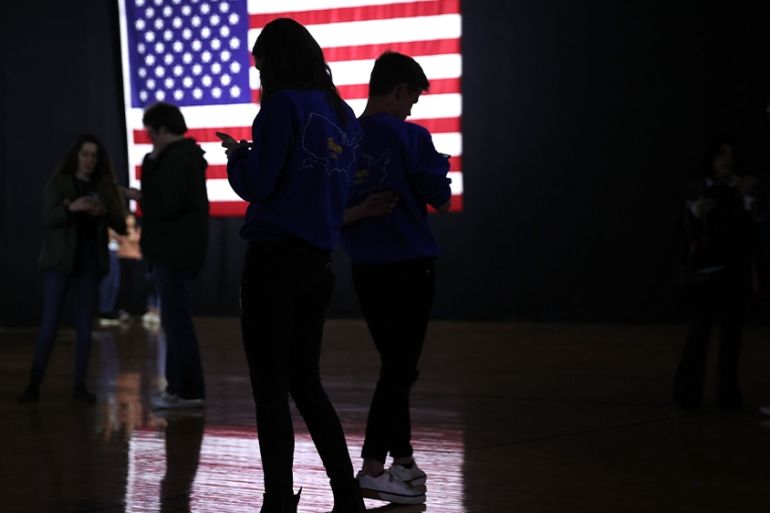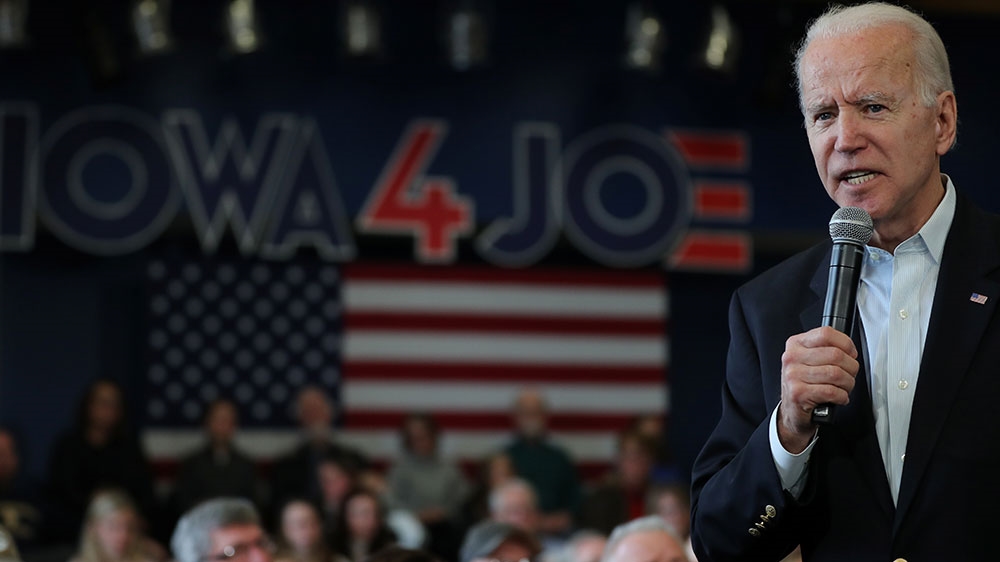Iowa fires starting gun for Democrats in race for US presidency
Caucuses in mid-western state mark start of Democratic campaign to defeat Donald Trump in November election.

Americans on Monday kicked off the first vote of the 2020 presidential race as the midwestern state of Iowa began its caucuses, the closely-watched first step in deciding which Democrat will face incumbent Donald Trump in November’s election.
The two frontrunners, left-wing Senator Bernie Sanders and former Vice President Joe Biden face a key test in the sparsely populated state, with a handful of others looking to make their mark to give their campaigns momentum.
Keep reading
list of 3 itemsUS election 2020: What are presidential primaries and caucuses?
US elections 2020: When are the debates, primaries, conventions?
The Iowa vote is a critical early look at the viability of the 11 Democratic candidates still in the race – even though just 41 Iowa delegates are up for grabs, a fraction of the 1,991 needed to secure the party nomination in July.
Iowa Democrats filed into nearly 1,700 caucus sites – schools, libraries, churches, mosques and meeting halls with Sanders and Biden in the lead in the state, followed by former South Bend, Indiana mayor Pete Buttigieg and Senator Elizabeth Warren, who is also on the left of the party.
But polling has fluctuated and Iowa’s quirky caucus system – where voting is not by secret ballot but by public declaration for a candidate – makes the night hard to predict.
|
|
Luke Elzinga, a volunteer for Sanders, appeared early at Lincoln High School in Des Moines which was converted into a caucus location.
“I think he really inspires a lot of young people, a lot of disaffected voters who might not otherwise turn out,” Elzinga, 28, told AFP news agency shortly before the caucusing began.
“And so I think he’s the best candidate to beat Trump.”
Three candidates – Sanders, Warren and Amy Klobuchar – have faced the unprecedented scenario of spending much of the past two weeks tethered to Washington for the impeachment trial of Trump instead of on the campaign trail in Iowa.
Even as candidates sought to make 11th-hour impressions on undecided voters, the senators were obligated to return to Washington for the trial’s closing arguments on Monday.
Defeating Trump
In a vote scheduled for Wednesday, Trump is almost certain to be acquitted by the Republican-led upper house on charges of abuse of power and obstruction of Congress.
For Democrats, second-tier hopefuls Klobuchar and tech entrepreneur Andrew Yang look to outpace expectations and seize momentum heading into the next contest in New Hampshire on February 11.
Earlier on Monday Biden – who still holds the lead in national polls – brought pizza to a field office in a strip mall near Des Moines to thank volunteers.
“I’m feeling good about today,” he said.

Like many candidates, Biden spent the weekend crisscrossing Iowa in a final push to convince undecided voters he is best placed to accomplish Democrats’ number one goal: defeating Trump.
The president has not stood idly by. On Sunday he branded Biden “Sleepy Joe” and described Sanders as “a communist,” previewing a likely line of attack were Sanders to win the nomination.
Unlike secret ballot voting, caucus-goers publicly declare their presidential choice by standing together with other supporters of a candidate.
Candidates who reach 15 percent support earn delegates for the nomination race while supporters of candidates who fall short can shift their allegiance to others.
Turnout is critical, and candidates and their representatives will seek to persuade voters on issues including healthcare, taxes and ending Washington corruption.
One key candidate who has opted not to contest in Iowa is billionaire businessman Michael Bloomberg, who entered the race in November but has surged into fourth place in RealClearPolitics’ national polling average.
The former New York mayor, who has spent more than $300m on advertising, according to Advertising Analytics, is focused on running a national campaign with particular emphasis on states that vote on “Super Tuesday,” on March 3.
